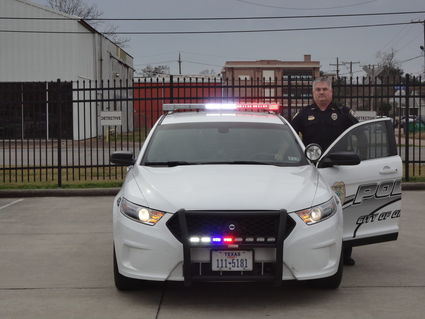DWI: A costly experience
Last updated 12/31/2013 at Noon

Officer Roush, of the Orange Police Department will be on the lookout for people driving while intoxicated over the holiday weekend. But, it is not only about alcohol, but also prescription drugs, medications and synthetic drugs.
New Year’s Eve may be over, but most local police officers know, the party is not really over and on the roadways will be too many people who have had too much to drink before getting behind the wheel of a vehicle.
Officer M. Roush, of the Orange Police Department, will be working this weekend and as part of his job duties will help make the roads a safer place to be by arresting drunk drivers. But, he is quick to point out, it is not just alcohol which makes people drive while intoxicated, but also prescription and other drugs, too.
According to Mothers Against Drunk Driving, an average drunk driver has driven drunk 87 times before their first arrest.
The whole process of making a driving while intoxicated arrest for a seasoned officer takes about two hours to complete from start to finish because of the many pieces to the puzzle.
“It’s not just one, but a combination of things,” Roush said of the things he looks for when making an arrest.
While out on patrol, Roush looks at what is going on in the city.
He looks for simple traffic offenses such as going too fast or too slow, driving in the middle of the road or not stopping at stop sign or traffic lights.
Once he initiates a stop, he makes contact with the driver.
This is where he will discover if the person pulled over is presumed to be under the influence of narcotics or alcohol.
As he approaches the vehicle, he will look inside for weapons and any evidence of open containers or pill bottles.
He will then ask for a driver’s license and proof of insurance.
While talking with them he observes their behavior by their reactions and speech.
Also, to see if they are impaired and can carry on a conversation.
Roush will also look to see if the person’s eyes are glassy, bloodshot or if the pupils are dilated.
If Roush determines the person is intoxicated, they may be asked to step out of their vehicle and walk to the back. He will once again see how they perform and if they are able to walk or if they stagger.
Next begins the testing. The field sobriety tests can consists of standing on one leg, walking and turning and touching their finger to their nose. However, this is not really when the test begins. It is actually when Roush gives the instructions to do the test. Roush gives two different tests and adjusts the tests depending on the abilities of the person involved.
If the person is believed to be intoxicated, they are advised they are under arrest and placed into the back of the patrol vehicle and transported to the Orange County Jail. Roush calls a wrecker service so the vehicle will be towed away. This will be the start of the money lost to pay for towing and storage fees, in addition to fines, attorneys and bond fees.
Once they arrive at the jail, the person will be taken to the intoxilizer room where they will be videotaped and once again undergo more tests. They will also be read a DIC24 which is a statutory warning. Roush will also ask for a breath or blood sample. However, there are times when a blood draw is mandatory such as if they are involved in an accident involving a serious injury, if a child is in the vehicle or if the latest charge is a felony.
If a person refuses to give a breath or blood sample, then Roush writes out a warrant. He will then call a representative from the district attorney’s office and later a judge to have the warrant signed. This is all done when the person is being booked in by jail staff. A short time later, with warrant in hand, a breath or blood sample is taken and sent to a lab for analysis.
In addition, the person who refuses to participate willingly in the sample, they are given a DIC25 and their license is suspended for 180 days. They must then go to the Department of Public Safety to work out the terms of getting it back.
To be legally intoxicated, the person must have a 0.08 blood alcohol level or higher. If a person has a 0.15 blood alcohol level or higher, they are not only really intoxicated, but what was once a Class B misdemeanor goes to a higher and more serious Class A misdemeanor. However, if they have two or more DWI convictions, then their charge is a state jail felony.
In addition, those charged with a Class B misdemeanor or more will remain in jail until they see a judge to be arraigned and so they can set bond.
After Roush completes his job at the jail, his work is not done yet. He still has reports to write and submit. The reports will go to a detective to be processed and wait on lab results. The case will then go to the district attorney’s office for possible prosecution.
According to Roush, it is not always about drinking alcohol, but also, is about prescription drugs, medications and synthetic drugs. In the end, it can be a tough experience for the person involved to endure. Their DWI experience does not end with being arrested. They may lose their license or job, too.
“A DWI can really change your life,” Roush said.
In 2010, 10,228 people were killed in a drunk-driving crashes which is one every 52 minutes while every minute someone is injured in an alcohol-related crash. In addition, one in three people will be involved in an alcohol-related crash in their lifetime, according to information from MADD.
Officer Roush, of the Orange Police Department will be on the lookout for people driving while intoxicated over the holiday weekend. But, it is not only about alcohol, but also prescription drugs, medications and synthetic drugs. RECORD PHOTO: David Ball














Reader Comments(0)